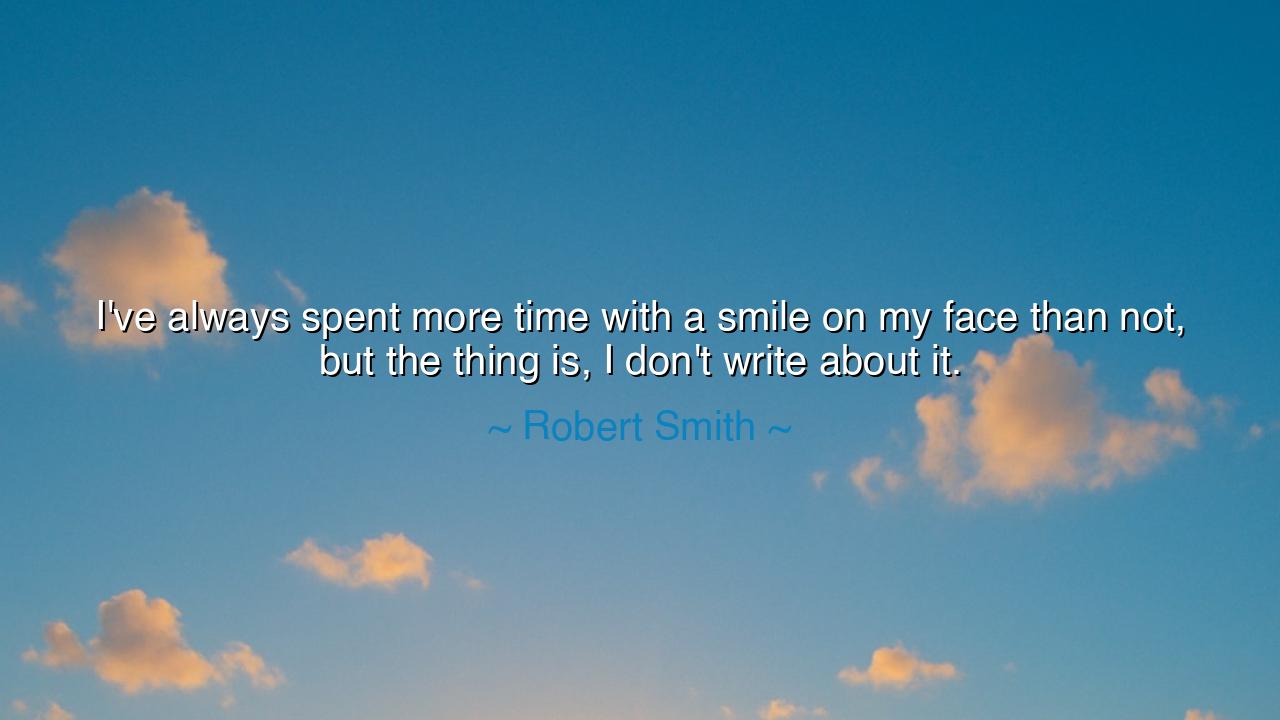
I've always spent more time with a smile on my face than not, but
I've always spent more time with a smile on my face than not, but the thing is, I don't write about it.






The words of Robert Smith—“I’ve always spent more time with a smile on my face than not, but the thing is, I don’t write about it.”—are a confession from the soul of an artist, a reminder that what is expressed in words, in songs, or in art, is but a fragment of the truth of a life. Many who walk this earth believe that an artist’s work is a mirror of his entire being, yet here Smith unveils a greater truth: that the heart often lives in joy, yet sings in sorrow, for sorrow is the language that the world more readily hears.
In the ancient way of wisdom, this speaks to the dual nature of existence: the outer life we live, and the inner life we keep hidden. One may laugh at the marketplace, share smiles among friends, and live days of light, while in the solitude of creation, one reaches for the darker ink, the melancholy notes, the shadows that cling to memory. For creation is not merely the act of living but the act of remembering, of giving form to that which clings to the soul most tightly. Joy flows like a river, refreshing but fleeting; sorrow carves valleys in the heart, and it is from these valleys that artists draw their deepest wells of expression.
Consider the tale of Vincent van Gogh. Though he painted fields alive with color, sunflowers blazing with golden fire, within him lived a storm of torment. Letters to his brother reveal moments of laughter, of fondness, of simple human warmth—yet his canvases, though radiant, carried a weight of longing and solitude. Like Smith, he lived with smiles, moments of light and laughter, but his pen and brush bore witness to darker struggles. This is not hypocrisy; it is truth. The world often mistakes the song for the singer’s whole life, yet the singer may carry within him joys unspoken, too delicate for the written page.
The meaning of Smith’s words is thus a warning against judgment and a teaching in humility. When we behold the work of another, we must remember: it is not the whole of their being. The poet who writes of despair may live with laughter at his hearth. The composer who weaves a dirge may still rejoice in the sunrise. The warrior who sings of loss may yet embrace his children with tenderness. Expression often leans toward what aches within us, for what aches demands release. Yet the smiles remain, though unwritten, etched into the life lived beyond the page.
This teaching calls us to see deeper into those around us. Too often, we take a person’s words or works as the final truth of who they are. But each soul is a tapestry of threads both bright and dark. To know another truly, one must look beyond their writings, their songs, or their outward expressions, and behold the unspoken smile, the unseen laughter, the hidden joy that often escapes the page. For every song of sorrow, there may be a thousand silent hours of peace.
What lesson, then, is given to us? It is this: do not let your silence conceal your light. If you live with joy, let it shine not only in your face but also in your words and deeds. Write it, sing it, share it, so that the world may know that joy, too, deserves remembrance. And if your art speaks mostly of sadness, let not your life be consumed by that voice—show the smile to your loved ones, remind them of the fullness of your being. To create is noble, but to live joyously is divine.
Practically, one might begin by recording not only griefs and struggles but also moments of happiness: a shared meal, a dawn well-spent, a kindness given or received. Keep a journal of light, so that when shadows fall, you may remember the truth of your brighter days. Share with others not only the lament but also the gratitude. Speak to your friends of laughter, not only of your wounds. In so doing, you leave behind not only the echo of your struggles but the living testimony of your joy.
Thus, Robert Smith’s words stand as both a revelation and a challenge. He reminds us that what is written is not the whole, and that within even the darkest poet may dwell a life rich with smiles. And he challenges us, the hearers, to bring balance—to let both our joys and our sorrows find voice. For the legacy of a life is not only in the songs of sorrow sung but in the unseen smiles that illuminate the world beyond the page.






AAdministratorAdministrator
Welcome, honored guests. Please leave a comment, we will respond soon